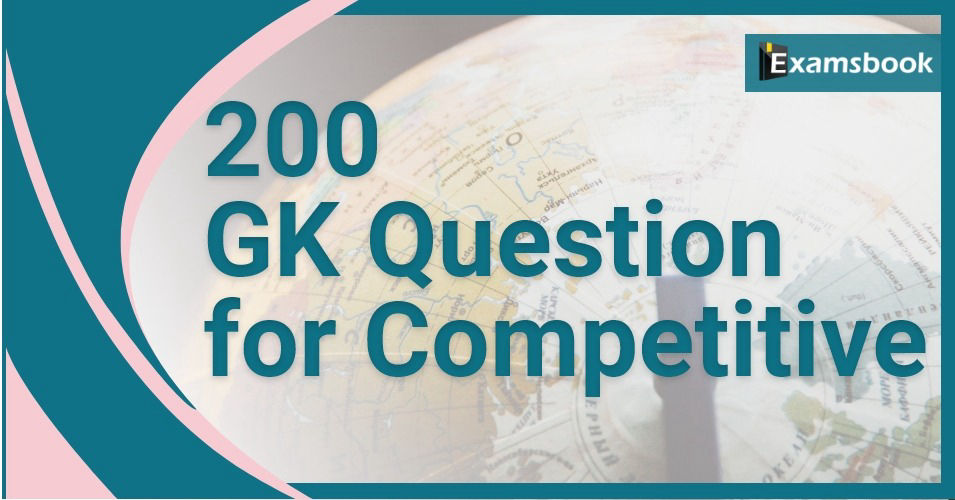200 General Knowledge Questions and Answers for Competitive Exams

Right to constitutional remedies comes under the?
(A) Legal Right
(B) Fundamental Rights
(C) Human Rights
(D) Natural Right
Correct Answer : B
Explanation :
This right comes under article 32 for Supreme court an article 226 for the high court. It is known as the right to constitutional remedies. In this right, the Supreme court, as well as high court, is given the power to instill the fundamental rights.
A result of the reorganization, what was the number of members of the Constituent Assembly in the year 1947?
(A) 450
(B) 572
(C) 299
(D) 272
Correct Answer : C
Explanation :
New elections were held for the West Punjab and East Bengal (which became part of Pakistan, although East Bengal later seceded to become Bangladesh); the membership of the Constituent Assembly was 299 after the reorganization, and it met on 31 December 1947.
In whom are the residuary powers of legislation vested under the Indian Constitution?
(A) President
(B) Prime Minister
(C) Parliament
(D) State
Correct Answer : C
Explanation :
Article 248 vests the residuary powers in the parliament. It says that Parliament has exclusive power to make any law with respect to any matter not enumerated in the Concurrent List or the State List.
The list of Fundamental Duties in the Indian Constitution was added as part of which of the following?
(A) 2
(B) 3
(C) 4
(D) 5
Correct Answer : C
Explanation :
The 42nd Amendment Act of 1976 added 10 Fundamental Duties to the Indian Constitution.
Who was the permanent Speaker of the Constituent Assembly?
(A) Mahatma Gandhi
(B) Jawaharlal Nehru
(C) Bhimrao Ambedkar
(D) Dr. Rajendra Prasad
Correct Answer : D
Explanation :
Rajendra Prasad was elected as the permanent chairman of the Constituent Assembly of Independent India.
The right to vote in elections to Parliament is ______?
(A) Fundamental Right
(B) Constitutional Right
(C) Legal Right
(D) Natural Right
Correct Answer : B
Explanation :
The correct answer is Constitutional Right. Right to Vote Right to vote in elections is an important constitutional right. What is true of the right to vote, is also true for the ;right to contest the election, that means it is also a constitutional right. However, Article 326 of the Constitution provides for universal adult suffrage but does not specifically mention the right to vote. It is celebrated on 25th January every year since the year 2011 to mark the Election Commission’s foundation day. It encourages more voters to take part in the political process. It observes a different theme every year. The theme for the year 2019 was “No voter to be left behind".
Which one of the following is not a 'Fundamental Right'?
(A) Right to equality
(B) Right to property
(C) Right to Freedom
(D) Right to Constitutional Remedies
Correct Answer : B
Explanation :
The right to property is not a Fundamental Right but it is a constitutional right. In the original Constitution, the right to property was listed as a fundamental right.
Which equality is provided for in Articles 17 and 18 of the Constitution?
(A) Social Equality
(B) Economic Equality
(C) Political Equality
(D) Religious Equality
Correct Answer : C
Explanation :
Article 17 (Abolition of Untouchability) and Article 18 (Abolition of Title), both are covered under Part III (Fundamentals Rights) of the Constitution which ensures an important role in the establishment of equality of status of citizens in India.
Which rule has been provided in Article 17 of the Indian Constitution?
(A) Equality before law
(B) Equality of opportunity in matters of government employment
(C) Abolition of titles
(D) Eradication of untouchability
Correct Answer : D
Explanation :
Article 17 of the Indian Constitution states that “Untouchability” is abolished and its practice in any form is forbidden. The enforcement of any disability arising out of “Untouchability” shall be an offence punishable in accordance with the law.
Which amendment of the constitution was offered full statehood to Arunachal Pradesh?
(A) 55th
(B) 16th
(C) 44tnh
(D) 65th
Correct Answer : A
Explanation :
Arunachal Pradesh was made a full-fledged state by 55th Constitutional Amendment Act. It grants Statehood to Arunachal Pradesh which consequently became the 24th State of the Indian Union.



